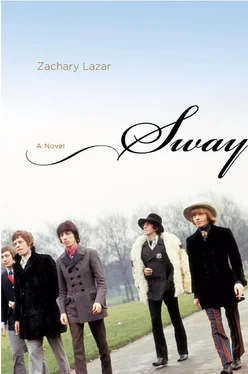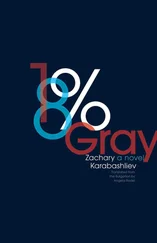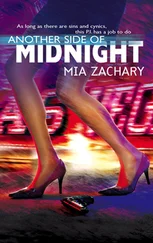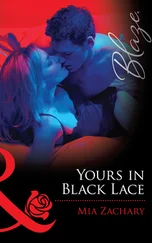The heat went on with a banging in the pipes. She heard cars passing in the street. She looked at the dim bedroom, lit by the streetlight through the thin curtains: the Moroccan tapestries, their clothes in piles on the floor, the mirror on its stand at the foot of the bed. He was stroking her shoulder beneath the sheet now, saying her name, his face burrowed against her back. She lay there with an impassive stare. He was emptied now, a boy seeking his mother. The more they stayed alone in this room, the more they seemed to merge.
Before he hit her, he sometimes looked wild, as if a spirit had entered his body. Afterward, she would see the old confusion in his eyes, the babyish rage, and the wildness would disappear. But before it disappeared, there was a glimpse of someone he never could be for very long: the blended image of themselves that they used to look for in the bedroom mirror. He would look like she’d imagined him the first time she’d seen him onstage.
The next day, all the papers printed front-page layouts of the band’s captioned photographs, all of which now looked like mug shots. Their disembodied heads stared out stupidly between blocks of text: “POP STAR ORGY. NAKED GIRL FOUND UPSTAIRS. FUTURE UNCERTAIN FOR MICK, OTHERS.” It was more serious than Keith had made it sound. According to the papers, he and Mick were both facing ten years in prison.
They had never stopped wondering when it would end. Until recently, for the last four years, they had done almost nothing but work, struggling to keep their luck going. They had written songs, recorded songs, promoted songs, toured behind songs, and it had turned out to be a kind of endless tantalization, a way of traveling the world without ever really seeing it. What they’d seen was duty-free shops, swimming pools, parking lots, ashtrays. They’d seen themselves, always at a remove, made increasingly strange by the scrutiny of cameras and the remoteness of crowds. They’d get jumbled together, speaking phrases and jokes that originated with one of the others, then seeing themselves in the others’ faces, a warped and disjointed reflection. In interviews, they didn’t have to be funny to make people laugh, or interesting to provoke their scorn. They became a set of pictures in magazines: pouting young men in lavender and rust, oddly tailored suits made of suede. As if cities were moods, each stop seemed to bring out in them some new kind of flamboyance, the ceaselessly changing backdrops — Sydney, Tokyo, Munich, Rome — triggering an urge to live out another aspect of the total freedom that was the compensation for having given up their identities. They wore white suits, white shoes, acrylic blue shirts with polka dots, sideburns and tinted sunglasses, and the girls never mentioned the sweat on their backs or the corn oil stench of their hair. They were all in their early twenties. They moved through everything in an increasingly arrogant fog, aware of secret jokes and ironies, except for Brian, who sometimes moved through it like someone already dead, standing onstage with a Vox guitar and bangs that covered his eyes.
It was no longer his band. It was Mick and Keith’s band. They wrote all the songs. The music they made was rhythm and blues with a jaded edge, the music of being young and famous and still dissatisfied, and onstage, in a French fisherman’s shirt and red jeans, Brian still seemed to somehow embody what the music said. He seemed to have gone past the point of wanting anything at all, and the fans, more and more of them male, could feel vicariously that they had gone past it too. They knew perfectly well about dissatisfaction, but now they could experience it as a consequence of fame, which they could imagine was theirs, and which turned out to be another, more glamorous form of isolation.
Onstage, as a “joke,” Brian would sometimes play the wrong parts to songs, especially the big hits, all of them originals, no longer covers, all of them written by Mick and Keith. The shows consisted of twenty or thirty minutes of violence. It was as if the prettier the band got, the more rivalrous they became, the more the crowd needed to feel the nightsticks. After the pressing of records, the stamping out of cardboard sleeves, the distribution of identical disks to thousands of distant stores, perhaps it was no wonder that when the fans at last heard the music live, in its pure form, they rioted.
Brian could not write original songs; his attempts were intricate and stiff, like formal exercises. In the studio, he would ornament the songs Mick and Keith came up with, adding color and instrumentation. As he did with his clothes, he would make striking collages out of different, seemingly incompatible styles. Marimba, saxophone, organ, piano, dulcimer, sitar — it became a strange kind of trap after a while. It was so easy. He began to think that Mick and Keith were providing him with simple frameworks, three-minute pop songs that would be nothing more than that unless he was there to transform them. It was a little boring for him sometimes, a little silly.
He would start with speed and liquor, then take a tranquilizer to calm himself down, then more speed to give him energy, then more liquor to relax. It would usually take several hours of these arduous switchbacks before he finally reached the summit of clarity, the buoyant sense of who he was, high above the petty, nagging fears of his isolation.
At the beginning of 1966, he met in Munich a nineteen-year-old girl with straight blond hair just like his. She had been traveling around Europe for more than a year, working in films and on model shoots. She was sophisticated in a way he knew nothing about and so would never understand.
“What is the matter?” she said.
He stared at her, unsurprised, vacant, the only color in his face in his lips. In the light of the dressing room, his hair was not so much blond as white. Onstage, in a turtleneck sweater and plaid slacks, he had looked otherworldly, almost albino, and now the impression was even stronger because he appeared to be on the verge of collapsing.
“They sent you in here, didn’t they?” he said.
“Who?”
He smirked a little, as if to echo her question. As if she were a spy.
She decided it couldn’t be real. One of the things Anita liked to do was to insist on contradicting other people’s emotions, particularly when they were self-indulgent. “I have a hotel room,” she said. “Do you speak German? Kannst du Deutsch? Ich habe ein Zimmer auf dem Bayerplatz .”
The dressing room had mirrors and lights, and the lights made his hair look like a wig and his face like a mask. Perhaps what made her stay was that he was so abstracted and strange and yet looked so much like her.
Three days later, when his house was still besieged by photographers, Keith drove to their flat in Earl’s Court. He had been practically living there when he wasn’t at his house in Sussex. It was Anita’s flat, and she had made it a kind of group headquarters. Keith had brought a stack of the tabloids with him in his car. He was trying to think of it all as a joke, and this was easier in the company of others. Perhaps the worst part of the bust was when everyone had gone home, retreating to their private lives, and for the first time, by way of memory, he’d had to experience in full the blunt stupidity of his hours alone in the police station: the deliberately pointless waiting, the detectives’ neutral voices, the drab ceremony of showing his driving license and having his fingerprints taken in the dim room.
He had changed in the last few months. Even his body looked different now, lean instead of scrawny, his black hair hacked off at different lengths so that it stuck up on the top of his head and fell down over his ears and the back of his neck. He was still quiet and sarcastic, but he was also the one who could be serious without it seeming like an affectation. He could see the others emulating him sometimes, stepping back from the world to process it in their minds. Even Anita, who mostly teased him, had started to do this. There was some secret attentiveness between them now that made him feel an odd generosity toward Brian.
Читать дальше












